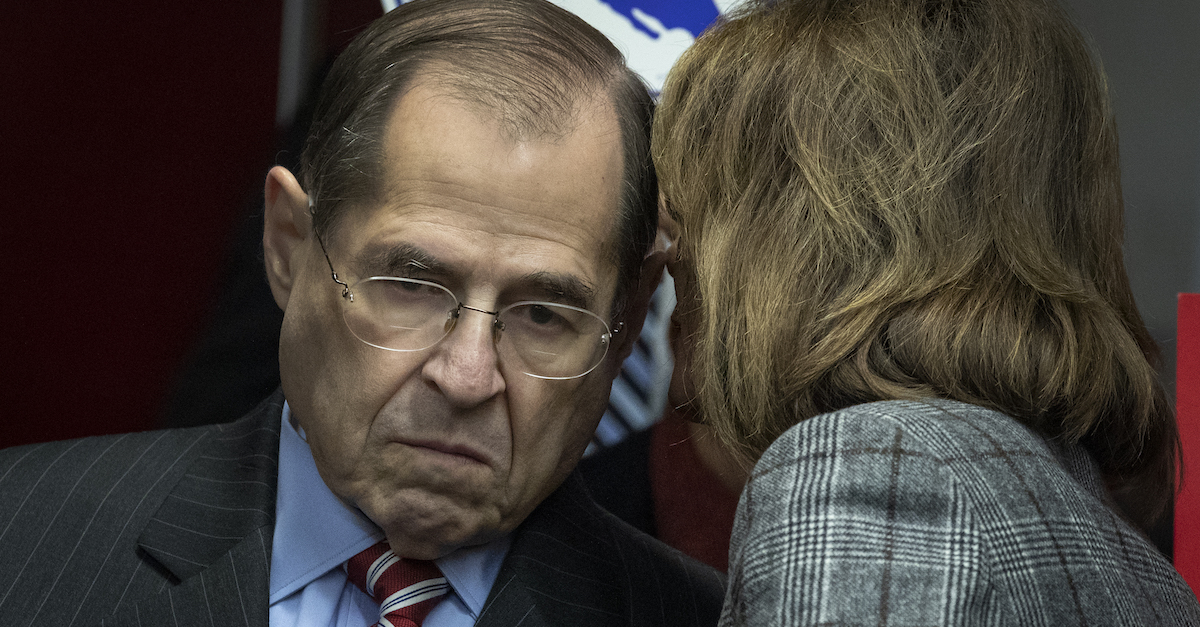
House Democrats on Friday asked the U.S. District Court for the District of Columbia unseal grand jury information related to “all portions of Special Counsel Robert S. Mueller III’s Report on the Investigation Into Russian Interference In The 2016 Presidential Election (the Mueller Report) that were redacted pursuant to Federal Rule of Criminal Procedure 6(e).” Leading Democrats have been loathe to say it out loud, but others haven’t been as shy: It’s about beginning the process of impeaching President Donald Trump.
The filing made clear that the House Judiciary Committee, chaired by Rep. Jerrold Nadler (D-N.Y.), is investigating whether to recommend articles of impeachment.
“This Court is authorized to disclose these materials pursuant to Rule 6(e)(3)(E) because the Committee seeks to use them ‘preliminarily to or in connection with a judicial proceeding,” it said. “The D.C. Circuit has construed that provision to apply where, as here, this Committee is conducting an investigation to determine whether to recommend articles of impeachment.”
Consequently, constitutional scholars like Harvard Law Prof. Laurence Tribe heralded the significance of the move, but not every expert is in agreement that this is a right and winning path to walk.
Tribe said Friday there was no question the “eagle has taken flight.”
“Here’s the petition formally announcing in DC federal court the impeachment inquiry in which the House is now engaged. No ifs ands or buts. No ambiguity. The eagle has taken flight,” Tribe tweeted. “Newsflash, sportsfans: ICYMI, an #ImpeachmentInquiry IS NOW UNDERWAY.”
Tribe went on to call the document “impressive,” while doubting the president could read it.
“The House petition enumerates a wide array of powerful grounds for impeachment. It’s an impressive document, to put it mildly. If Trump could read, it’d drive him crazy. (Not a long drive, to be sure),” Tribe said.
Ross Garber, a CNN legal analyst, attorney and professor of Political Investigations & Impeachment Law at Tulane Law School, had a different take on the Friday news. In his view, the move by Democrats was “startlingly weak.”
“Chairman Nadler said recently the Judiciary Committee was evaluating articles of impeachment. This filing verifies that impeachment is under consideration,” Garber told Law&Crime. “It is a startlingly weak and ineffectual impeachment process. But it’s the process the House leadership has chosen.”
Garber said Democrats already got a substantial amount of information from the Mueller Report, plus Mueller’s testimony (in which he said the president was “not exculpated“). Garber wondered what else they are looking for.
“The House got a detailed report and testimony from Mueller. If they think the info presented establishes Trump committed impeachable offenses, then why not act now? What other info are they looking for?” he asked. “And if they need more information, they are certainly taking their sweet time to get it. Not the kind of approach you’d expect if a president committed high crimes or misdemeanors and is unfit to serve.”
Separately Garber said that “While there is some precedent for releasing grand jury info in connection with a formally constituted impeachment proceeding, the reasoning for doing so is thin and weak (impeachment as preliminary to judicial proceeding).”
“Not a winner,” he added.
In their application, Democrats also expressed a desire to get their hands on the following information:
(2) any underlying transcripts or exhibits referenced in the portions of the Mueller Report that were redacted pursuant to Rule 6(e); and (3) transcripts of any underlying grand jury testimony and any grand jury exhibits that relate directly to (A) President Trump’s knowledge of efforts by Russia to interfere in the 2016 U.S. Presidential election; (B) President Trump’s knowledge of any direct or indirect links or contacts between individuals associated with his Presidential campaign and Russia, including with respect to Russia’s election interference efforts; (C) President Trump’s knowledge of any potential criminal acts by him or any members of his administration, his campaign, his personal associates, or anyone associated with his administration or campaign; or (D) actions taken by former White House Counsel Donald F. McGahn II during the campaign, the transition, or McGahn’s period of service as White House Counsel.
[Image via Drew Angerer/Getty Images]